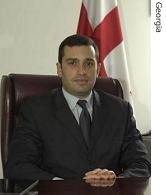2007年VOA标准英语-Georgia Accuses Russia of New Airspace Violatio
搜索关注在线英语听力室公众号:tingroom,领取免费英语资料大礼包。
(单词翻译)
By Suzanne Presto1United Nations
23 August 2007
Georgian U.N. Ambassador Irakli Alasania is accusing Russia of new airspace violations2. Georgia is already pursuing investigations3 into an alleged4 incursion and missile launch earlier this month. From VOA's United Nation's bureau, Suzanne Presto reports.
 |
| Ambassador Irakli Alasania |
Russian news agencies quote a Russian military officer as denying the claim.
Georgia alleges6 that Russia has repeatedly violated its airspace. Georgian officials say on August 6th, Russia launched a missile that landed five kilometers from a Georgian radar7 site, but did not explode. Russia's U.N. Ambassador Vitaly Churkin has accused Georgia of fabricating the incident.
Alasania says Georgian experts held bilateral8 consultations9 with a team of Russian experts in Tbilisi. But he says the Russian delegates were not cooperative.
"Given the Russian refusal to acknowledge even the most basic facts surrounding the incident, Georgia felt that further consultations with Russia would prove pointless," he said. "We wish this were not the case."
| Georgian specialists examine the remains of the rocket near Tsitelubani, South Ossetia, Georgia, 07 Aug. 2007 |
"Russia, meanwhile, has been unable to provide any evidence that may in any way contradict the conclusions of the independent international experts," he said. "Russia's only defense11 has been to cast doubt without any basis whatsoever12 on the competence13 of and impartiality14 of the expert groups that I mentioned."
Alasania dismissed claims made Tuesday by Russian Ambassador Churkin that Georgia planted evidence. Churkin alleged that missile fragments were not even Russian, and that Georgia suspiciously destroyed the missile.
Alasania confirms that two devices found at the missile site were not typical of Soviet15 missiles. But he says Georgian experts believe the two western-produced chips were incorporated into a Russian missile so that missile could be used against Georgian radar systems, which are of Soviet origin.
Alasania adds that experts destroyed the missile because the unexploded warhead posed a threat to investigators16. He said this is standard operating procedure, and adds that the missile was fully17 photo-documented first. He said much of the missile remains.
"We have over 2,500 parts of the missile, which is totally enough to identify the missile and track them back in Russia. So the claims yesterday made here is totally groundless," said Alasania.
Russia's ambassador has suggested that the missile is from a former-Soviet stockpile and was planted by Georgia. Alasania dismissed that claim, saying the missile's manufacture date is October 1992, making it Russian and not Soviet.
 收听单词发音
收听单词发音 




